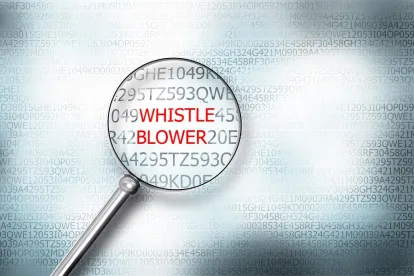The Ninth Circuit held that the anti-retaliation provisions of the Sarbanes-Oxley Act do not protect whistleblowers who make internal complaints about potential violations of the Foreign Corrupt Practices Act (FCPA). The court’s ruling limits the remedies available to employees who claim to have suffered adverse employment actions in retaliation for raising FCPA concerns.
SOX’s Whistleblower Anti-Retaliation Provision
Section 806 of the Sarbanes-Oxley Act (SOX) makes it unlawful for a public company to take adverse employment action against an employee who, among other things, raises internal concerns about conduct that the employee reasonably believes constitutes a violation of “any rule or regulation of the Securities and Exchange Commission” or “any provision of Federal law relating to fraud against shareholders.” A whistleblowing employee who alleges retaliation in violation of Section 806 may bring a civil claim against their employer in federal court, subject to certain procedural requirements. At issue in Wadler was whether the phrase “any rule or regulation of the [SEC]” encompasses the statutory provisions of the FCPA.
The Wadler Decision
In 2015, Sanford Wadler, former general counsel of a laboratory, sued the laboratory for wrongful termination. Among other things, he claimed that the laboratory terminated him in violation of SOX § 806 for making internal reports about potential FCPA violations in China. In 2017, a federal jury found for Wadler, awarding him $11 million in damages.
On appeal, the laboratory took issue with the trial court’s jury instructions on Wadler’s SOX claim, arguing that the internal disclosure of potential FCPA violations lies outside the protection of § 806, because the statutory provisions of the FCPA do not constitute SEC “rules” or “regulations.” The Ninth Circuit agreed. The court acknowledged that the words “rule” and “regulation” could encompass a statute when read in isolation. Reading the words in the context of SOX § 806, however, it held that those words plainly refer only to the SEC’s administrative rules or regulations, which do not encompass the FCPA, a congressionally enacted statute. Accordingly, while the court upheld the trial court’s instruction on Wadler’s state law claim that the laboratory’s retaliation violated California public policy, it vacated and remanded the SOX claim, with instructions to determine whether a new trial was warranted. In so doing, the court noted that a properly instructed jury mighthave found that Wadler was terminated in retaliation for complaining about the possible falsification of books and records, which is prohibited by an SEC “rule or regulation” (namely Exchange Act Rule 13b2-1).
Conclusion
This appears to be a case of first impression, and it remains to be seen whether other circuits will follow the Ninth Circuit’s lead or whether the issue will reach the U.S. Supreme Court. Both the petition for panel rehearing and petition for rehearing en banc were denied, and there has been no petition for Supreme Court review. Thus, for the time being, it appears that internal whistleblowers in the Ninth Circuit who claim to have suffered retaliation for reporting possible FCPA violations will be limited to whatever remedies may be available to them under state law.





 />i
/>i

